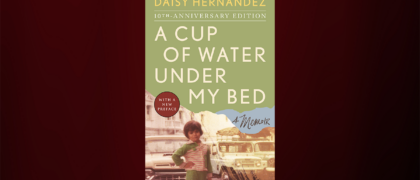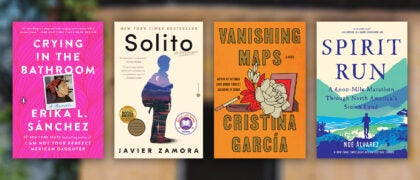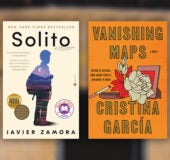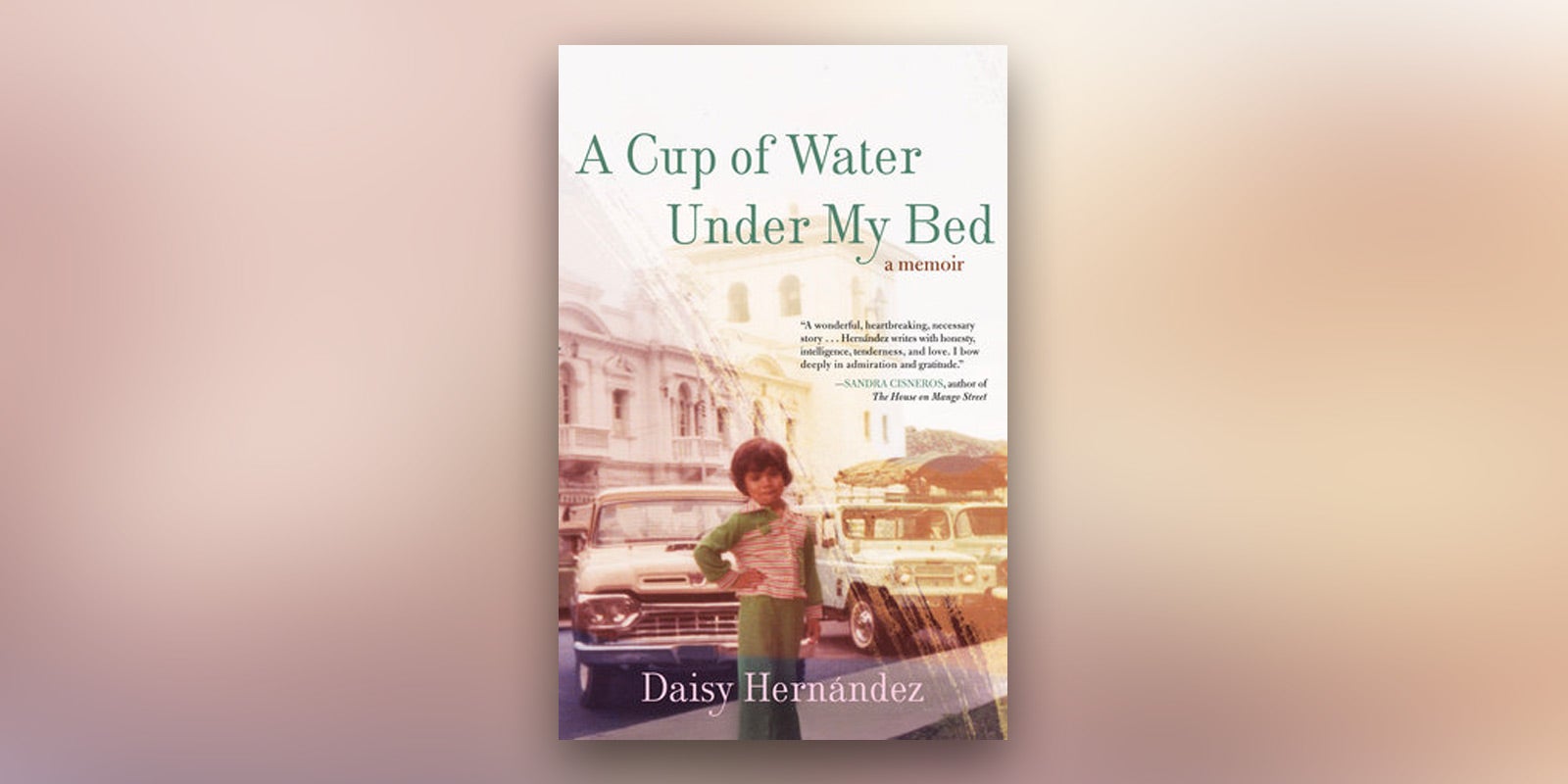Before Love, Memory
They come for me in a station wagon. My mother already has me dressed in a navy-blue plaid jumper and a white blouse. She has yanked my dark hair into pigtails and now makes the sign of the cross on my forehead before turning me over to a skinny lady, who ushers me into the backseat of the station wagon. I join a small group of children, mostly Cuban, all of us dressed alike, our eyes bright and nervous.
The station wagon lady drops us off at the steps of a gloomy castle in Union City, New Jersey: Holy Family Catholic School. The yard is hemmed in with black iron bars and the front doors are made of steel. Women in dress pants roam the cement grounds like fat hens with their wings clipped, their beaks pointing and gesturing. I huddle with the other children in packs of three and five like scared chicks.
Miss Reynolds is the kindergarten teacher. She has glasses that make her eyes look like oversized buttons on her face, and she speaks the funny language that comes out of the television set at home when we are not watching telenovelas or the
noticias, which is to say that she talks like the cartoon character Mighty
Mouse. It is English, a language that sounds like marbles in the mouth. It is fun to hear, but mostly because the mouse on the TV screen is flying.
Sitting in the classroom, I wait for Miss Reynolds to start talking like my mother. In Spanish. Surely it won’t be long now. An hour passes. Two hours. An entire day it feels, and still it is all Mighty Mouse.
I am familiar with the language. I even speak a few words of it. But I have never heard so much of it all at once. It’s like being forced to watch the same cartoon all day long.
I don’t know if this is what actually happened on my first day of kindergarten, but it is what I remember of my first two years in school. A few memories can be confirmed by research and on-site inspection: Mighty Mouse on television, the school’s black iron bars. My mother verifies the station wagon lady and the ethnicity of the other children, and school photographs offer details of the
uniform and my teacher’s face.
There are, however, missteps in memory, places where emotion has distorted people, sights, even
cuerpos. In a school photograph, for example, my teacher is a skinny, androgynous white woman with thick glasses. But I remember her as a fat hen, a flying mouse, and kindergarten as the beginning of the end.
A teacher comes for us one day. Just two of us. Me and my friend, a thin, pixie-faced girl.
I don’t know why we are being taken from class, but in the darkened hallway as we find ourselves farther from our classroom, my friend starts crying, and hers are not baby tears. They are full blast,
llorona wails. She roots herself to the ground and refuses to take one more step. The teacher begins dragging her by the arm, but the harder the woman pulls, the more my friend yells and twists, and for an instant, it looks as if her left arm is threatening to rip from her body, as if she will choose self-mutilation over what is to come at the hands of white women. As for myself, I don’t fight. I follow.
In an empty classroom, the white woman pulls out a deck of cards with pictures and words. She spreads the cards on a broad table, one by one. The sun is pouring through the window and coating us in a yellow liquid, but I can decipher the cards. Each one holds a picture and a word:
dog,
cat,
house. I am to repeat each word after the teacher.
In Spanish, we have
cartas. Tía Rosa’s husband uses them to talk with the spirit world. The cards tell us about jobs that are about to arrive, ancestors who are unhappy, a case pending with immigration. The cards are paper doors only special people can open.
I look at the white woman’s cards and listen to her bold English words
—dog,
cat,
house—and there is all the evidence of what is to come in my life. I am not to go the way of the two people I long for in the thick terror of the night. The first man I love and the first woman I adore, my father and my mother with their Spanish words, are not in these cards. The road before me is English and the next part too awful to ask aloud or even silently: What is so wrong with my parents that I am not to mimic their hands, their needs, not even their words?
Before language, there is love. Before love, memory.
What I know of the world before kindergarten is the uneven sidewalks of Union City, New Jersey. The shop with its fat chickens hollering at us and nipping at the wire cages. The sharp smell of chicken blood when the little beasts are killed in back and brought in white plastic bags to my mother. The fabric store with its bins carrying spools of thread like a Cubana holding up the ends of her apron. The buses that snake up and down Bergenline Avenue. The store jammed with cigars and wrinkled men and women
folding the ends of the thick brown leaves.
Our national language is Spanish and there are many kinds. Mostly it is the firecracker Spanish of my Cuban father and his friends. It smacks the air and the back of my head and the inside of my ears. There is also the Spanish of the Puertorriqueño Tía Rosa has married. His words mimic popcorn when it first begins popping. Finally, there is Colombian Spanish. My mother’s language does not crack or bounce. It stays close to the earth, to thick hands and the smooth sides of stones.
English has a place here. It is the language of minorities, and you hear it every now and then, mostly from Mighty Mouse on television or the older kids on the block. English is a game of marbles. The words shoot after each other. They bump and plod and leave tracks on the ground, and it is a decent game, English that is, but everything real happens in Spanish: the way women complain about the
fábricas where they work, how they yell at you to not play in the street, how they drag you into the house when the sky turns a velvet black, lying to you: “
Ahorita sales otra vez.”
Terrible things happen in Spanish.
My father and his friend get drunk, slur their words, and turn into screeching birds. Rage is an awful habit in any language, I suppose, but on our street, in our home, in Spanish, it takes on awful proportions, and the mothers complain to each other in shorthand: “
Qué se va ‘cer?” The reply is always the same:
Así son los hombres.
Women are different.
Union City is filled with virgins. La Caridad, La Altagracia, La Virgen de Chiquinquirá. They come from Cuba, the Dominican Republic, and Colombia. Like us, they are a matter of multiplicity.
There is never one of anything in this world. There are many virgins, many women, many sounds in Spanish.
Dollars, though, are a constant. In the kitchen, my mother folds aluminum foil over dollar bills and packs them into envelopes. The dollars are to be mailed with letters to her mother in Colombia.
We send dollars because of the wars. It is the eighties and there are two wars. The one in Colombia is about land and poor people. The other one, the Cold War, means my mother and I cannot travel to Cuba. “It isn’t safe,” my father says in between puffs of his thick cigar.
We travel instead to Hialeah, Florida, and Mami and I go together by plane to Bogotá and Boyacá, and by train to Queens and Manhattan. By the time I start kindergarten, I feel these places and New Jersey are part of the same country. Everyone lives within its borders, speaks Spanish, and eats a lot of fried pork.
In the evening, my mother turns on the television for the
noticias. The stories arrive from Latin America. Women with missing teeth cry into microphones. Men with brown faces scream.
Los niños carry younger children. Sometimes, it is only the image of men’s feet in their shoes and the white sheets covering the rest of their bodies. The women wail behind the reporter, who talks about the number of dead and those left behind.
“
Ay,
los pobres,” my mother whispers, before turning her eyes and her pregnant belly away from the television screen.
But I don’t look away. I want to see what it is all about, because my mother comes from that place in the television set and so does my father. Those places where the floor is a thick brown soil and men’s bodies disappear save for their shoes.
Copyright © 2014 by Daisy Hernandez. All rights reserved. No part of this excerpt may be reproduced or reprinted without permission in writing from the publisher.












